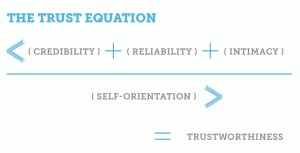Trusting your colleagues will make you more trustworthy to your customers
If you’re trying to sell your services, you already know the value of being trusted. Being trusted increases value, cuts time, lowers costs, and increases profitability—both for us and for our clients.
As a solo practitioner, being trustworthy is pretty straightforward (note that I didn’t say it’s easy). But when you are part of a company and have to rely on other colleagues, it can feel much more complex.
What effect does trusting your colleagues have on being trustworthy with your client?
Let’s start with the obvious: we are all human, with very human needs. In the world of professional services, these needs probably show up as some flavor of wanting to help the client succeed, wanting to provide the right solution, wanting to be good at what we do, or wanting to be respected and liked.
In organizations where there is low trust, when you have to rely on your colleagues, these human needs can become vulnerabilities – actually getting in the way of doing what’s right for the client:
- You become territorial about your client, or concerned about your credibility, so you limit and control access to your client
- You’re not an expert in someone else’s knowledge area, so you don’t bring it to the client as a possible solution
- You want to be the one to solve the client’s problems, so you take on more than you can handle, or tasks for which others are better suited
And so – despite the best of intentions and because of being only human – you become a bottleneck. You limit your client’s access to all the company has to offer, and you create (at best) unnecessary complexity and delays in providing solutions, or (at worst) a single source of failure when things aren’t going well.
It takes a village
Building trust within your organization is a powerful way to overcome these vulnerabilities. The easiest way to explore this is through the Trust Equation:

When you trust your colleagues, you can be more trustworthy for your client. We can see this in all four variables of the trust equation.
When you trust your colleagues:
You don’t have to be the expert on everything, so you can bring more and better solutions, and be candid when he doesn’t personally know something, which increases your credibility
You can delegate work to better meet commitments on time, and get the information you need to alert the client if a commitment can’t be met, which increases your reliability
You know your colleagues and leadership stand behind you, so you can take more personal risk with your client, which increases your intimacy
You don’t worry about your colleagues’ motives, so you are willing to introduce more people to the client, and you can focus on the client’s needs without distraction, which demonstrates low self-orientation
Building Trust Internally
Trust in the workplace starts with the organization (Charles Green wrote a great blog about organizational trust), but trust among employees still is a personal choice – and while you cannot force someone to trust you, you can be more trustworthy.
In our workshops, we ask participants how they can be better trusted advisors to their colleagues. Here are five ways they identified to increase trustworthiness among employees:
- Be trusting. Extending trust is a powerful Intimacy move – taking the risk to trust someone creates space and momentum for them to trust you in return. The ultimate trust paradox.
- Respond fast. We’re all responsive to our clients, but how responsive are we to our colleagues? If you are busy with client work or need to prioritize requests for a short time, consider an automated email response that lets people know you are unavailable and when you will
- Listen more, and better. Good listening is a low self-orientation skill that creates high intimacy. Try holding your questions until the end of a presentation, acknowledging what someone said before asking them a question, or asking a coworker about their weekend (and then really listening to their response)
- Share information freely. It’s no accident that transparency is one of the four Trust Principles. Sharing information freely increases every variable of the trust equation, especially if it’s bad news (here’s a tip for sharing bad news).
- Seek to know others. For biggest impact, this is both knowing more people and knowing people at a deeper level. To expand your network, introduce two coworkers who don’t know each other, eat lunch in the cafeteria, or join a virtual community. To deepen relationships, address people by name, start a meeting with personal introductions, or invite a coworker for coffee.
So if you’re working hard to build trust with your clients, take a look at how you’re doing with your colleagues.




Trackbacks & Pingbacks
[…] To for continued reading check out: Trusting your colleagues will make you more trustworthy to your customers […]
Leave a Reply
Want to join the discussion?Feel free to contribute!